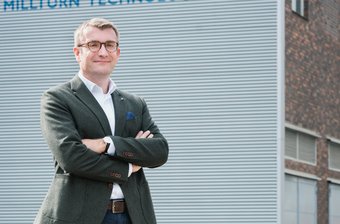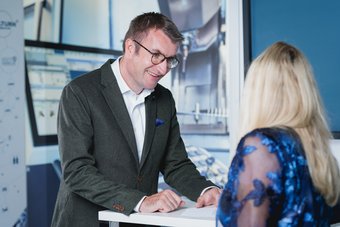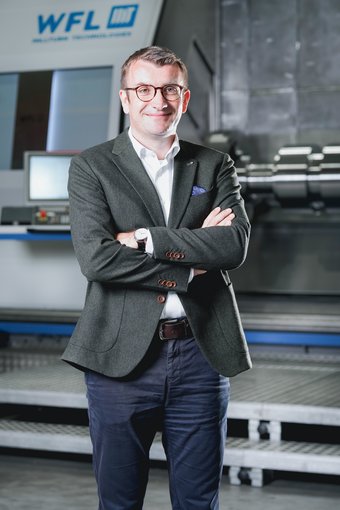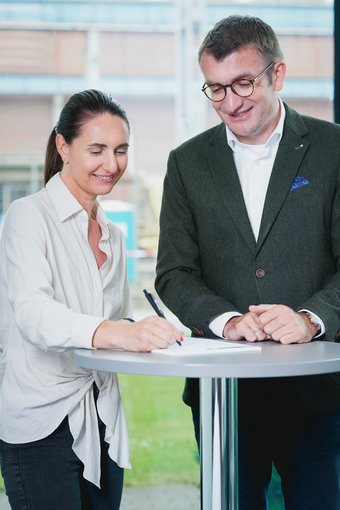Finance with finesse
Stefan Hackl in conversation with COMPLETE
Midfielders on the football pitch, ski racers flying down hair-raising slopes, aircraft pilots and rally drivers all have it: just two words that play an incredibly important role in sports and in these people’s lives – control and oversight. Without these attributes, many tasks would simply be impossible and new ideas would never make it past their infancy. Oversight is essential if you want to take forward-looking, anticipatory action. Financial controlling requires both control and oversight to keep company finances robust and stable.
Meticulous fine-tuning when implementing control measures like the design and integration of various planning situations is just as important as having a vigilant eagle eye to monitor the central and local coordination of investment decisions. In other words: the level of accuracy and oversight employed in financial activities is crucial to a company’s success. We are fortunate enough to have had someone with the oversight of a midfielder, a vigilant eagle eye and the precision of a ski racer managing finance at WFL for a few years now. Mr Stefan Hackl not only provides certainty in uncertain times, but also looks for new ways to move successfully towards the future. Complete magazine’s editor ventured into the complex world of finance to speak to Mr Stefan Hackl about his own life and managing the complexity of a 500-person-strong company.
- Mr Hackl, you have been at WFL for four years now and, as CFO, are a passionate supporter of the company. How did you get on when you first started and what challenges did you face?
I have great memories of my first few days and weeks at WFL because there is such a friendly, helpful and welcoming atmosphere here. The open door policy made finding my feet a lot easier because my colleagues were happy to answer any questions I had. There were three challenges though: the first was getting to know the company. How does it work, what exactly does it do and where are the issues – as controller, that’s what you need to know to work out where you stand. Secondly, you have to get to know your colleagues, which is not that easy when there are so many of them. The third challenge is the team that you work with directly. You have to get to know them too, and discuss how to handle future tasks.
- Accuracy is essential in finance. How do you combine oversight and control efficiently?
It’s only possible if you have a good understanding of the entire company. I call it the ‘economic engine’. We need a good grasp of what the cost drivers – and value drivers – are, how mechanical engineering works on a day-to-day basis, plus lots more besides. These factors needs to be translated into figures, which then enables a controller to understand how the different departments work and which tasks are important. In this line of work, it is also vital to have an interest in the relevant topics. That insight enables you to maintain oversight and helps you to find solutions faster and more efficiently in tricky situations,
- Tell us about your career path.
I grew up in the Austrian city of Leonding, near Linz, and attended primary and secondary school there. I obtained my school leaving certificate at the upper-secondary academic school in the Diocese of Linz and then went on to study business administration at Johannes Kepler University Linz, specialising in tax, finance and accounting. So it was already pretty clear where I was headed. After graduating, I joined KPMG, a large accounting firm, where I spent many challenging but positive years and learnt a lot. I wanted to understand how things work in operational business and prepared figures for precisely this type of company. This is what led me to move to VIVATIS, where I got to work on these kinds of tasks. I later got the chance to take on a new role at ELOPAK, a Scandinavian beverage carton manufacturer, where I was able to hone my skills as the Director of Finance in CEE and gained a lot of experience. In 2016, I then completed the Master of Business Law postgraduate programme at the University of St. Gallen in Switzerland. All these milestones led me to WFL, where I started in 2019.
- The stress of everyday life rarely lets up. How do you handle difficult situations?
It’s important to approach critical situations with a proactive mindset. You should never just stick your head in the sand – always look for solutions. Often the focus is on the problem and in particular on anything that is difficult in a situation. That tends to have a negative effect and drives action into a downwards spiral. Problems have to be addressed; they need to be discussed and handled proactively and openly. That’s the only way to resolve them swiftly.
- What helps you to recharge your batteries outside of work?
There are three main things that help me do that. The first is my family, which gives me strength and that all-important support. The second is sports. I love hiking, cycling, running and mountain climbing, and these activities always help me to recharge my batteries and re-energise. The third is my friends, who provide that necessary change of pace and compliment the first two areas perfectly. I also mustn’t forget holidays and long weekends. Variety helps to give you a boost so you can give your all.
- Are you a numbers person or are you creative as well?
I basically see myself as a generalist with a huge affinity for numbers, but I also believe that no area can function without creative solutions. If you ask a design engineer or a purchaser, they’d tell you the same thing. You need a creative approach to think outside of the box sometimes. Often you have to take a different route, perhaps even a diversion (or several), to get to where you want to go. So creativity is really important and necessary.
- What’s your view on the current global situation and where does WFL stand in it all?
Generally speaking, the financial world is a reflection of what is happening in various places around the globe. The world is becoming more confusing and complex and is changing at an ever-faster pace. Things that were valid yesterday might already be meaningless today. Interest rates are a good example of this, and electromobility. Historically, we are once again at a turning point and, like the industrial revolution many years ago, that means change. The keyword is AI (artificial intelligence), and this is one area that is becoming increasingly important and prevalent. But that’s change – you can’t stop it. You have to adapt to it. I don’t mean to suggest that we are in a doomsday scenario; I simply want to show that there will undoubtedly be changes around the world but we will tackle them together. And every change that we encounter should motivate us to grow and develop as well. It’s similar to how we deal with stressful situations. When we find ourselves in this situation, we identify the opportunities and act creatively. That’s precisely what we do at WFL. When times get stormy, we come along with an innovative product and help to shape the future.
- Is it possible to plan with 100% certainty in finance or are there factors that are impossible to calculate?
Two quotes come to mind when answering this question. The first is “No plan survives first contact with the enemy!” by Helmuth von Moltke and the second is this quote from Albert Einstein: “Planning replaces coincidence by error.” Despite these quotes, I firmly believe that it is essential to plan ahead. Perhaps things might not always go as planned, but you still need a direction. We need to know where we are headed and to be able identify any deviations so that we can correct our course. In other words, planning means preparing. We plan our route to the summit. And regardless of whether we have to take any diversions, the destination remains the same. So essentially, planning is extremely important but you have to be prepared for diversions.
- When you hear the words ‘oversight’ and ‘control’, what springs to mind and why?
Both are essential. If you don’t have oversight, there’s a risk that you will act rashly, and control makes me think of management. As I mentioned earlier, the journey, the goal and the planning are all really important, and to get there we need control too.
- Where do you see WFL in the next 5–10 years?
I see WFL as an innovative, world-renowned partner for challenging production tasks. We’re actually already there, but I can see us being even bigger and stronger in the future. With our new machine series and the developments we have planned for the future, WFL will maintain its strong position and go on to achieve even more.
- Do you have any suggestions or things you’d like to happen to improve finance even further at WFL?
The first thing to remember is that there is always room for improvement. For me, the mission is always the most important thing in finance. As a department, we are the company’s sparring partner, pilot and service organisation. When departments need support, we are more than happy to help them put together plans for whatever projects they have in mind. In that regard, we are always happy to receive requests and suggestions and for departments to tell us what they need support with so we can achieve our shared goals.




